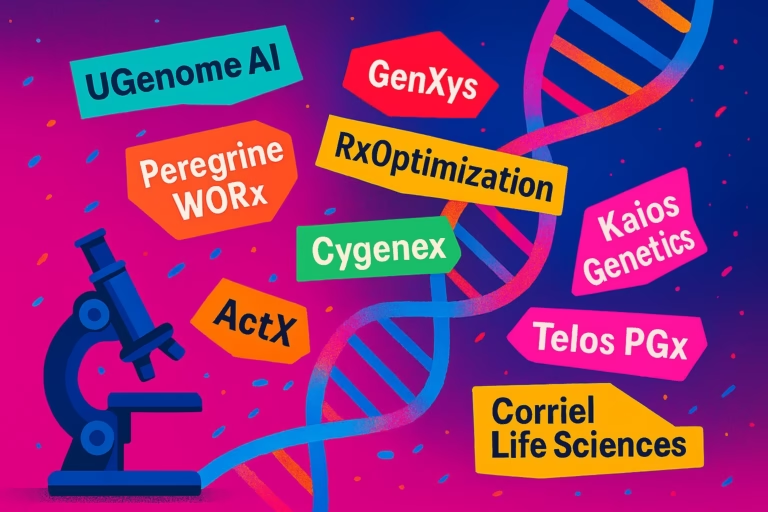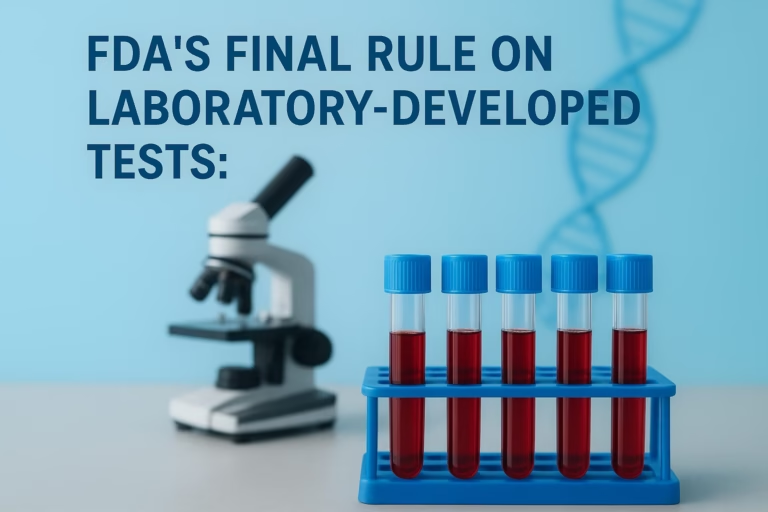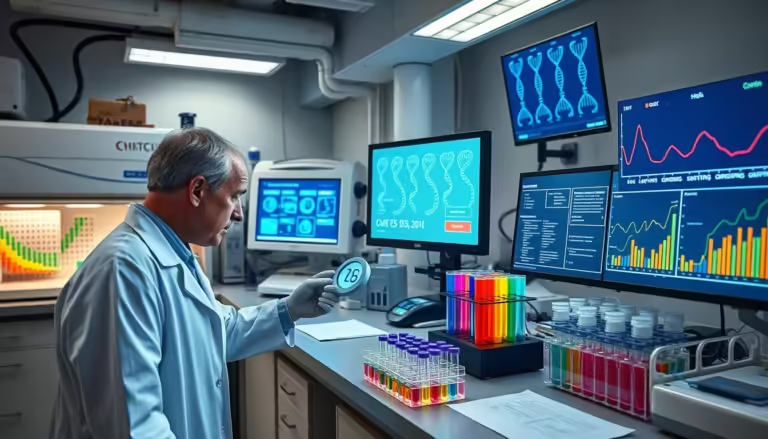“The future of medicine is personalized, predictive, and preventive.” – Dr. Francis Collins, Director of the National Institutes of Health1
Pharmacogenomics, a discipline at the intersection of genetics and pharmacology, elucidates how genetic variations influence drug efficacy and safety. This field is witnessing significant strides, heralding a new era in healthcare where treatment is tailored to individual genetic profiles. Such advancements promise to enhance drug efficacy and reduce adverse effects1. Through rigorous research, scientists are deciphering the role of genetic variants in drug response, laying the groundwork for predictive and precision medicine1. The advent of artificial intelligence is further propelling this transformation, enabling the swift and accurate analysis of genetic data for tailored therapeutic interventions2. Let’s talk about advancements in pharmacogenomic testing.

The pharmacogenomics market is experiencing exponential growth, fueled by the escalating need for personalized medicine and the acknowledgment of genetic influences on drug efficacy2. These innovations in pharmacogenomic testing are set to redefine drug development, ushering in an era of targeted therapies and precise dosing. This shift is anticipated to significantly improve patient outcomes and healthcare efficacy.
The Burgeoning Field of Pharmacogenomics
In the rapidly evolving world of medicine, pharmacogenomics has emerged as a transformative field, unlocking the potential for personalized therapies. This discipline explores the intricate relationship between an individual’s genetic makeup and their response to various medications3. By tailoring drug treatments to an individual’s genetic profile, healthcare providers can enhance the efficacy and safety of prescribed medications, ultimately leading to better patient outcomes.
Exploring the Interplay Between Genetics and Drug Response
Pharmacogenomic research has shed light on the critical role that genetic variations play in drug metabolism and the risk of adverse drug reactions4. Advancements in this field have enabled the development of genetic tests that can predict an individual’s response to specific medications, paving the way for more targeted and personalized treatment approaches3. By understanding how genetic factors influence drug efficacy and safety, healthcare professionals can make more informed decisions, minimizing the risk of adverse events and optimizing the therapeutic benefits for their patients.
Paving the Way for Personalized Medicine
The integration of pharmacogenomics into clinical practice has the potential to revolutionize the way healthcare is delivered. Personalized medicine, driven by the insights gained from genetic testing, enables clinicians to tailor drug therapies to an individual’s unique genetic profile4. This approach can significantly reduce the risk of adverse drug reactions, a significant cause of hospitalizations and mortality globally3. Moreover, the use of non-invasive sampling methods, such as buccal swabs, has made the process of genetic testing more accessible and convenient for patients, further facilitating the integration of pharmacogenomics into clinical practice.
“Pharmacogenomics has the potential to transform the way we approach drug development and patient care, ushering in a new era of personalized, precision-based medicine.”
As the field of pharmacogenomics continues to evolve, healthcare professionals and researchers are working to overcome the challenges and unlock the full potential of this revolutionary approach to patient care. By harnessing the power of genetic information, the future of medicine holds the promise of more targeted, effective, and safe treatments, ultimately improving patient outcomes and quality of life34.
Pharmacogenomics Patient Portals: Empowering Personalized Care
The evolution of pharmacogenomics has ushered in patient portals that empower individuals to engage actively in their healthcare. These platforms grant patients direct access to their genetic data, facilitating an enhanced comprehension of how their genetic profile affects their medication response5.
Enhancing Patient Education and Engagement
Pharmacogenomics patient portals are pivotal in augmenting patient education and engagement. They deliver tailored information on genetic influences on drug metabolism and response, demystifying complex genomic concepts. This empowers patients to make well-informed decisions regarding their treatment options5. Such an informed populace often exhibits improved treatment adherence and superior health outcomes6.
Facilitating Shared Decision-Making and Treatment Adherence
These portals also facilitate shared decision-making between patients and healthcare providers. By granting patients access to their genetic data, they enable discussions on the most appropriate treatment strategies tailored to their genetic profiles5. This collaborative approach enhances patient empowerment and treatment adherence6.
The ongoing evolution of personalized medicine underscores the critical role of pharmacogenomics patient portals in empowering patients and refining healthcare quality5. By bridging the gap between genetic insights and personalized care, these platforms herald a future where precision medicine is the standard, not the exception7.
Artificial Intelligence in Pharmacogenomics: Revolutionizing Data Analysis
The advent of artificial intelligence (AI) in pharmacogenomics has significantly transformed data analysis, offering unprecedented insights and reshaping personalized medicine. Through the application of machine learning and deep learning algorithms, AI has become a crucial element in deciphering complex patterns within vast genomic datasets. This capability enables the accurate prediction of individual drug responses, marking a significant leap forward in the field8.
Machine Learning for Drug Response Prediction
Machine learning algorithms have been pivotal in pharmacogenomic data analysis, enabling the forecasting of an individual’s response to specific medications. These sophisticated analytical tools uncover intricate relationships between genetic markers and drug efficacy, thereby facilitating the creation of precision medicine strategies tailored to individual patient needs8. The synergy between AI and genomics is set to redefine personalized medicine, revolutionizing drug development and treatment optimization processes8.
Uncovering Novel Drug Targets and Treatment Optimization
AI has also made substantial progress in identifying novel drug targets and optimizing treatment regimens. By dissecting large-scale genetic and clinical data, AI-driven systems reveal previously unknown genetic markers and pathways that modulate drug efficacy and safety9. This groundbreaking information propels the development of more targeted and effective therapies, ultimately enhancing patient outcomes and quality of life10.
The fusion of AI with pharmacogenomics marks a paradigm shift in precision medicine. As these technologies advance, we anticipate further groundbreaking developments, heralding a future where personalized healthcare is the standard rather than the exception.
“The convergence of AI and pharmacogenomics holds the promise of revolutionizing drug development, treatment optimization, and the delivery of truly personalized healthcare solutions.”
| Key Advancements | Impact |
|---|---|
| Accurate drug response prediction | Enables personalized treatment plans and improved patient outcomes |
| Identification of novel drug targets | Accelerates the development of more effective and targeted therapies |
| Treatment optimization | Enhances the overall efficacy and safety of personalized medicine approaches |
The integration of artificial intelligence in pharmacogenomics has ushered in a new era of personalized medicine, transforming drug development, target identification, and treatment optimization. As these cutting-edge technologies continue to evolve, we anticipate further advancements, setting the stage for a future where precision healthcare becomes the norm.
Advancements in Pharmacogenomic Testing
The realm of pharmacogenomics has seen substantial progress, heralding a shift towards a more individualized medical paradigm. Pharmacogenomic testing now enables the analysis of genetic variations to forecast an individual’s response to medications, thereby enhancing drug efficacy and reducing adverse drug reactions11.
These developments are especially crucial in neuropsychiatric medications, where genetic influences significantly affect drug metabolism and pharmacodynamics11. For instance, individuals with certain genetic profiles may exhibit significantly higher plasma concentrations of tricyclic antidepressants, highlighting the critical role of pharmacogenomic testing in these treatments11.
Moreover, pharmacogenomic testing has been instrumental in guiding dosage adjustments for various medications. For aripiprazole, a prevalent antipsychotic, the initial dose for poor metabolizers should be substantially reduced, and the extended-release injectable suspension dosage may require genetic-based adjustments11.
Advances in pharmacogenomic testing have also identified genetic markers that predict the likelihood of severe adverse drug reactions. For instance, individuals with the HLA-B*1502 allele should avoid carbamazepine due to a heightened risk of severe skin reactions11.
These advancements have set the stage for a more personalized and effective healthcare approach, where treatments are customized to each patient’s genetic makeup. By harnessing the insights from these tests, healthcare professionals can refine drug selection, dosage, and monitoring, leading to enhanced patient outcomes and reduced healthcare expenditures12.
The evolution of pharmacogenomics is further being propelled by the integration of artificial intelligence (AI) and sophisticated data analysis techniques13. AI-powered platforms in pharmacogenomics now facilitate the development of precise medicine based on genetic data, accelerating the discovery of drug targets and fostering the creation of innovative therapies13.
The impact of these advancements in pharmacogenomic testing is profound, reshaping medical practice and generating economic value for pharmaceutical companies through tailored treatments and more efficient drug development13. As the global pharmacogenomics market expands, with a projected compound annual growth rate (CAGR) of 19%, the future of personalized medicine appears increasingly promising13.
The Expanding Global Pharmacogenomics Market
The global pharmacogenomics market is witnessing exponential growth, fueled by the escalating demand for personalized medicine and the acknowledgment of genetic variations’ pivotal influence on drug efficacy14. Industry projections indicate that the pharmacogenomics market size was USD 15 billion in 2022 and is anticipated to surpass USD 35.67 billion by 2032, with a CAGR of 9.1% from 2023 to 203214.
Market Growth and Projected Trajectory
The pharmacogenomics market’s expansion is further accentuated by its robust regional performance. In 2022, North America emerged as the market leader with a 41.3% share, followed closely by Europe with 28% and Asia Pacific with 19%14. The oncology segment notably dominated the pharmacogenomics market in 2022, accounting for 30.2%, underscoring the burgeoning role of genetic testing in cancer treatment14.
Advances in genetic testing, such as the polymerase chain reaction segment’s 36.9% market share in 2023, have significantly contributed to the pharmacogenomics market’s growth14. The integration of pharmacogenomics into government healthcare systems heralds a significant opportunity for the advancement of precision medicine in healthcare14.
| Region | Market Share (2022) |
|---|---|
| North America | 41.3% |
| Europe | 28% |
| Asia Pacific | 19% |
The pharmacogenomics market is set for sustained growth, with a projected value of USD 8.11 billion by 2032, and an expected annual growth rate of 10.3% over the next eight years15. This growth is bolstered by substantial investments in research and development by leading pharmaceutical companies, such as Eli Lilly and Company’s USD 7,190.8 million investment in 202215.
The integration of cutting-edge technologies, such as artificial intelligence (AI) and machine learning (ML), in genetic data analysis for drug discovery has significantly impacted the pharmacogenomics market15. As personalized medicine gains traction, the continued advancements in genetic testing technologies and the integration of pharmacogenomic data into clinical decision-making processes will further propel the expansion of the global pharmacogenomics market14.
The pharmacogenomics market is poised for remarkable growth, with the market size projected to more than double by 203216. The kits & reagents segment dominated the market in 2023, accounting for USD 2 billion, while the sequencing segment held the highest market share of 40.2%16. The personalized medicine segment is anticipated to grow at a CAGR of 10.3% through 2032, underscoring the increasing importance of tailored treatment strategies based on individual genetic profiles16.
The oncology segment is poised to reach USD 2.3 billion by 2032, reflecting the growing integration of pharmacogenomics into cancer care16. North America and the United States, in particular, are expected to lead the charge, with the North American market projected to witness a CAGR of 10.4% during the forecast period and the U.S. market set to reach USD 2.9 billion by 203216.
The global pharmacogenomics market is experiencing significant growth, driven by the rising demand for personalized medicine and the recognition of the crucial role played by genetic variations in drug response.
Real-World Implementation: A Case Study
To evaluate the tangible effects of pharmacogenomics in a practical context, a thorough retrospective analysis was undertaken. This analysis leveraged data from the Clinical Pharmacogenetics Unit at the La Paz University Hospital (LPUH), a leading tertiary public institution in Spain17. Over a 12-month span, the unit executed 1,145 pharmacogenetic tests, marking a 35% escalation from prior figures17. The Oncology department emerged as the primary sector for genotyping patients, underscoring the burgeoning role of pharmacogenomics in cancer treatment17.
Integrating Pharmacogenomics into Clinical Practice
The study further illuminated that 1,000 PGx tests were initiated for patients likely to benefit from genotype-based dosing adjustments, and 76 individuals ultimately received tailored dose modifications17. Such findings underscore the successful embedding of pharmacogenomics within clinical settings, offering profound insights into its practical application17.
| Metric | Value |
|---|---|
| Pharmacogenetic tests performed | 1,145 |
| Growth rate increase compared to previous data | 35% |
| Individuals susceptible to receive dose modification | 1,000 |
| Individuals receiving genotype-guided dose adjustment | 76 |
This case study vividly illustrates the adept real-world implementation of pharmacogenomics within clinical practice, shedding light on its transformative potential17. The incorporation of pharmacogenomics into standard patient care heralds a new era of personalized medicine, poised to significantly enhance therapeutic outcomes across diverse therapeutic domains17.

“The successful integration of pharmacogenomics into clinical practice showcases the transformative potential of this field in delivering personalized, data-driven healthcare solutions.”
Overcoming Barriers to Adoption
Despite the vast potential of pharmacogenomics18 to revolutionize personalized medicine, several hurdles impede its widespread integration into healthcare. These obstacles encompass economic, ethical, and institutional challenges, necessitating a comprehensive strategy for their resolution.
Economic Challenges
The perceived lack of cost-effectiveness stands as a primary obstacle to pharmacogenomic testing adoption. Studies indicate that PGx-guided medication management can yield substantial cost savings, reducing adverse events by 30% and achieving nearly $7,000 in direct medical charge savings per patient19. Nonetheless, the initial investment required for PGx testing acts as a deterrent for healthcare providers and institutions.
Ethical Challenges
Ethical concerns surrounding the utilization of genetic information in healthcare also impede the adoption of pharmacogenomics. Patients may be reluctant to undergo PGx testing due to apprehensions regarding data privacy and the potential for genetic discrimination. It is essential to address these ethical concerns through robust data protection policies and clear communication with patients, thereby fostering trust and promoting the acceptance of PGx testing.
Institutional Challenges
Institutional barriers, such as the lack of standardization in PGx testing and interpretation, further complicate its adoption. Historically, four metabolizer phenotypes have been identified, but the varying levels of evidence for different PGx tests can lead to disparities in the interpretation of results18. Streamlining the testing process, enhancing provider education, and fostering collaboration between healthcare institutions and accredited PGx laboratories can help surmount these institutional challenges.
To fully harness the potential of pharmacogenomics, a multifaceted approach is imperative. By tackling the economic, ethical, and institutional barriers, healthcare providers and policymakers can facilitate the widespread adoption of this transformative technology. This will ultimately lead to enhanced patient outcomes and a more sustainable healthcare system.
| Barrier | Potential Impact | Proposed Strategies |
|---|---|---|
| Economic Challenges |
|
|
| Ethical Challenges |
|
|
| Institutional Challenges |
|
|
“By addressing the economic, ethical, and institutional barriers, healthcare providers and policymakers can pave the way for the widespread adoption of this transformative technology, ultimately leading to improved patient outcomes and a more sustainable healthcare system.”
Through a collaborative and multidisciplinary approach, the challenges hindering the adoption of pharmacogenomics can be effectively addressed. This will unlock the full potential of personalized medicine and significantly enhance patient care1819.
Regulatory Landscape and Clinical Guidelines
The integration of pharmacogenomics (PGx) into routine clinical practice has been facilitated by regulatory bodies and the development of comprehensive clinical guidelines20. This integration significantly impacts patients’ responses to drugs20. Regulatory agencies, such as the U.S. Food and Drug Administration (FDA) and the European Medicines Agency (EMA), have recognized the importance of this information21. They have incorporated PGx data into drug labeling, making it readily available to prescribers and patients.
Organizations like the Dutch Pharmacogenetics Working Group (DPWG) and the Clinical Pharmacogenetics Implementation Consortium (CPIC) have developed comprehensive clinical guidelines21. These guidelines evaluate the associations between over 100 gene-drug pairs, providing a framework for the integration of PGx into routine clinical practice21. Patients with PGx actionable test results who follow DPWG recommendations have shown a lower percentage (21%) of clinically relevant adverse drug reactions (ADRs) compared to the control group (27.7%) receiving standard treatment21.
The regulatory landscape for PGx has evolved, with the FDA and EMA playing a crucial role in assessing and regulating PGx information21. The EMA provides guidelines for the co-development of PGx biomarkers or assays, emphasizing compliance and reliability of PGx assays21. At the national level, regulatory bodies within Europe, such as the Gemeinsamer Bundesausschuss in Germany and the Medicines and Healthcare Regulatory Agency in the United Kingdom, ensure compliance with regulations and authorize medicinal products21.
The integration of pharmacogenomics into clinical practice is further supported by hospital leadership, pharmacy and therapeutics committees, and collaborations between various departments21. By securing funds, infrastructure, and amending regulations in favor of personalized medicine, these stakeholders are paving the way for the widespread adoption of PGx-guided therapy21.
As the regulatory landscape and clinical guidelines continue to evolve, the field of pharmacogenomics is poised to play an increasingly pivotal role in the future of personalized medicine20. Dr. Yuan Ji, a board-certified expert in clinical pharmacology and medical genetics and genomics, has presented on the advancements in technologies and regulatory frameworks in clinical PGx testing, addressing the challenges and opportunities arising from the evolving regulatory landscape20.
The Future of Personalized Medicine
The future of personalized medicine is intricately linked with the evolution of pharmacogenomics. As our comprehension of the intricate relationship between genetics and drug efficacy deepens, the incorporation of pharmacogenomic testing into everyday clinical practice is poised to revolutionize healthcare22. This integration will empower healthcare professionals to tailor medication choices, dosages, and treatment plans to individual genetic profiles, thereby enhancing therapeutic outcomes and efficacy22.
Pharmacogenomics’ advancement, fueled by technological innovation, regulatory backing, and collective research endeavors, heralds a future where personalized medicine becomes the norm, fundamentally altering healthcare paradigms22. The surge in FDA approvals for drugs with pharmacogenomic labels from 2000 to 2020, reaching 28.2%, highlights the escalating significance of pharmacogenomics in drug development and clearance22.
As pharmacogenomics continues to advance, we anticipate significant strides in precision medicine, where therapies are meticulously aligned with an individual’s genetic makeup22. The broader adoption of pharmacogenomics in clinical settings will lead to more precise treatments, diminishing adverse drug reactions, augmenting drug effectiveness, and yielding superior patient outcomes22. This healthcare metamorphosis will not only elevate patient care but also propel the future of personalized medicine, cementing its role in the quest for enhanced health and wellness.
Source Links
- https://www.ncbi.nlm.nih.gov/pmc/articles/PMC7255432/ – Pharmacogenetics: An Important Part of Drug Development with A Focus on Its Application
- https://www.mdpi.com/1424-8247/17/7/940 – Pharmacogenomics: A Genetic Approach to Drug Development and Therapy
- https://blog.puritanmedproducts.com/pharmacogenomics-testing – Exploring the Intersection of Genetics and Pharmaceuticals: Introduction to Pharmacogenomics Testing
- https://www.scu.edu/ethics/focus-areas/bioethics/resources/pharmacogenomics-ethics-and-public-policy/ – Pharmacogenomics, Ethics, and Public Policy
- https://www.ncbi.nlm.nih.gov/pmc/articles/PMC8371796/ – Perception of personalized medicine, pharmacogenomics, and genetic testing among undergraduates in Hong Kong
- https://www.mdpi.com/2075-4426/14/1/22 – User Experiences of Pharmacogenomic Testing and Opinions among Psychiatry Patients
- https://www.ncbi.nlm.nih.gov/pmc/articles/PMC5117918/ – Role of pharmacogenetics in public health and clinical health care: a SWOT analysis
- https://www.ncbi.nlm.nih.gov/pmc/articles/PMC7877825/ – Precision Medicine, AI, and the Future of Personalized Health Care
- https://jhmhp.amegroups.org/article/view/6818/html – Artificial intelligence in healthcare—the road to precision medicine
- https://pgx.ai/ – PGxAI | Pharmacogenetics | Artificial Intelligence | Personalized Medicine
- https://www.ncbi.nlm.nih.gov/pmc/articles/PMC3939793/ – Pharmacogenomic Testing for Neuropsychiatric Drugs: Current Status of Drug Labeling, Guidelines for Using Genetic Information, and Test Options
- https://www.ncbi.nlm.nih.gov/pmc/articles/PMC10622662/ – Advancing pharmacogenetic testing in a tertiary hospital: a retrospective analysis after 10 years of activity
- https://www.linkedin.com/pulse/advancements-pharmacogenomics-deep-dive-latest-research-miranda-7c3bc – Advancements in Pharmacogenomics: A Deep Dive into the Latest Research and Innovations
- https://www.biospace.com/pharmacogenomics-market-size-is-forecasted-to-worth-usd-35-67-billion-by-2032 – Pharmacogenomics Market Size is Forecasted to Worth USD 35.67 Billion by 2032
- https://www.linkedin.com/pulse/pharmacogenomics-market-size-share-trends-analysis-report-hancock-myu2c – Pharmacogenomics Market Size, Share & Trends Analysis Report By 2032
- https://www.gminsights.com/industry-analysis/pharmacogenomics-market – Pharmacogenomics Market Size & Share, Forecasts Report 2032
- https://www.mdpi.com/2075-4426/12/3/421 – Real-World Impact of a Pharmacogenomics-Enriched Comprehensive Medication Management Program
- https://www.nature.com/articles/s41398-021-01600-7 – Barriers to clinical adoption of pharmacogenomic testing in psychiatry: a critical analysis – Translational Psychiatry
- https://www.pharmacytimes.com/view/the-pharmacogenomics-data-are-in-so-why-is-adoption-still-lagging- – The Pharmacogenomics Data Are In So Why Is Adoption Still Lagging?
- https://arup.utah.edu/education/ji-pharmtest-2024.php – ARUP Scientific Resource for Research and Education: Educational Resources – Current Clinical Pharmacogenomic Testing: How Do Clinical Laboratories Stay on Top of Changes to Technologies, Professional Guidelines, and Regulations?
- https://www.frontiersin.org/journals/pharmacology/articles/10.3389/fphar.2023.1189976/full – Frontiers | Pharmacogenomics in practice: a review and implementation guide
- https://www.rgare.com/knowledge-center/article/pharmacogenomics-the-future-of-precision-medicine – Pharmacogenomics: The Future of Precision Medicine






2 Comments